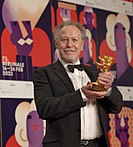Wikipedia:Main Page history/2023 March 3
From today's featured article
The Waddesdon Bequest was left to the British Museum in 1898 by Baron Ferdinand Rothschild's will. Taken from his New Smoking Room at Waddesdon Manor, it consists of almost 300 pieces, including jewellery, plate, enamel, carvings, glass and maiolica. Earlier than most objects is the Holy Thorn Reliquary, probably created in the 1390s in Paris for John, Duke of Berry. The wide-ranging collection is in the tradition of a treasure house, such as those owned by the Renaissance princes of Europe. Most of the objects are from late Renaissance Europe; there are several important medieval pieces, and outliers from classical antiquity and medieval Syria. Rothschild selected intricate, superbly executed, highly decorated and rather ostentatious works of the Late Gothic, Renaissance and Mannerist periods for this collection. Few of the objects relied on the Baroque sculptural movement for their effect, though several come from periods and places where many Baroque pieces were being made. (Full article...)
Did you know ...
- ... that Generosity of Alexander (pictured) is a painting that shows Alexander the Great giving his mistress to a painter as a gift?
- ... that after leading the Khoikhoi in war against the Dutch at the Cape of Good Hope, Doman returned to Dutch service as an interpreter?
- ... that of thirty-five Palestinians killed in the West Bank in January 2023 by Israeli forces and settlers, twenty were from the Jenin refugee camp?
- ... that the first secular school in Catalonia was founded by the anarcha-feminist Teresa Mañé?
- ... that East Timor uses the United States dollar, but produces its own coins to facilitate smaller transactions?
- ... that Mark Robinson was a world champion in submission wrestling, sumo and powerlifting?
- ... that Kaharuddin Datuk Rangkayo Basa refused to be buried at a heroes' cemetery, and so was buried at a regular public cemetery upon his death?
- ... that in the 2000s, New York City's Benjamin Hotel offered a pillow menu and hired a sleep concierge?
In the news
- A train crash in Thessaly, Greece, kills at least 57 people.
- At least 67 migrants are killed in a shipwreck off the coast of Calabria, Italy.
- On the Adamant (director Nicolas Philibert pictured) wins the Golden Bear at the Berlin International Film Festival.
- Floods and landslides leave more than 64 people dead in the Brazilian state of São Paulo.
- At the British Academy Film Awards, All Quiet on the Western Front wins Best Film and six other awards.
On this day
March 3: Liberation Day in Bulgaria (1878); Hinamatsuri in Japan
- 1776 – American Revolutionary War: Samuel Nicholas and the Continental Marines successfully landed on New Providence in the Bahamas and began a raid of Nassau, capturing the port the next day.
- 1875 – French composer Georges Bizet's opera Carmen (poster pictured), based on the novella of the same title by Prosper Mérimée, premiered at the Opéra-Comique in Paris.
- 1972 – The British rock band Jethro Tull released Thick as a Brick, a parody concept album allegedly adapted from an eight-year-old boy's epic poem.
- 2012 – Two passenger trains collided near Szczekociny, Poland, resulting in 16 deaths and 58 injuries.
- Michael Kantakouzenos Şeytanoğlu (d. 1578)
- Ghulam Kadir (d. 1789)
- Tolu Ogunlesi (b. 1982)
From today's featured list
Today's featured picture

|
The Woman Suffrage Procession was a suffragist parade held in Washington, D.C., on March 3, 1913, the day before Woodrow Wilson's first presidential inauguration. It was organized by Alice Paul for the National American Woman Suffrage Association. Thousands of suffragists marched down Pennsylvania Avenue "in a spirit of protest against the present political organization of society, from which women are excluded". The march and the attention it attracted were important in advancing women's suffrage in the United States. This image shows the front cover of the official program of the Woman Suffrage Procession, illustrated by Benjamin Moran Dale. It depicts an elaborately dressed woman blowing a trumpet with a "Votes for Women" banner while riding on horseback in front of the United States Capitol. Illustration credit: Benjamin Moran Dale; restored by Adam Cuerden
Recently featured:
|
Other areas of Wikipedia
- Community portal – The central hub for editors, with resources, links, tasks, and announcements.
- Village pump – Forum for discussions about Wikipedia itself, including policies and technical issues.
- Site news – Sources of news about Wikipedia and the broader Wikimedia movement.
- Teahouse – Ask basic questions about using or editing Wikipedia.
- Help desk – Ask questions about using or editing Wikipedia.
- Reference desk – Ask research questions about encyclopedic topics.
- Content portals – A unique way to navigate the encyclopedia.
Wikipedia's sister projects
Wikipedia is written by volunteer editors and hosted by the Wikimedia Foundation, a non-profit organization that also hosts a range of other volunteer projects:
-
Commons
Free media repository -
MediaWiki
Wiki software development -
Meta-Wiki
Wikimedia project coordination -
Wikibooks
Free textbooks and manuals -
Wikidata
Free knowledge base -
Wikinews
Free-content news -
Wikiquote
Collection of quotations -
Wikisource
Free-content library -
Wikispecies
Directory of species -
Wikiversity
Free learning tools -
Wikivoyage
Free travel guide -
Wiktionary
Dictionary and thesaurus
Wikipedia languages
This Wikipedia is written in English. Many other Wikipedias are available; some of the largest are listed below.
-
1,000,000+ articles
-
250,000+ articles
-
50,000+ articles




